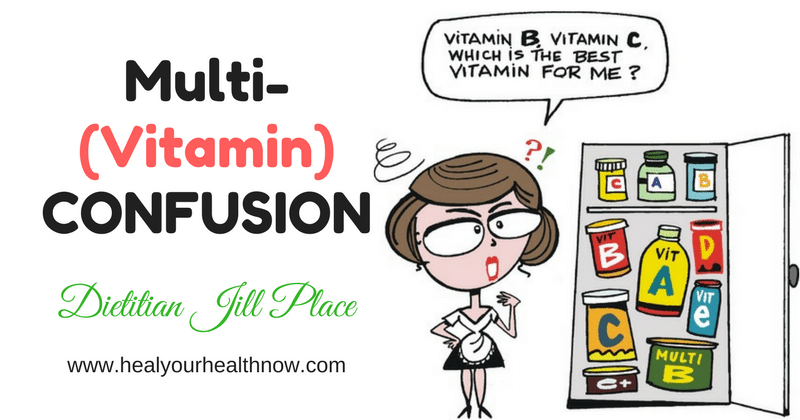
To Take or Not to Take Multis … that is the Question …
A landmark article in the Journal of the American Medical Association a couple of decades ago urged doctors to prescribe multivitamins for all their patients. But a few years ago, another article came out saying that multis weren’t effective. Now we have a few recent studies that literally scream, “Don’t Waste Your Money on Multivitamins, Doctors Say.” And yet more recent research from the prestigious Federation of American Societies for Experimental Biology (FASEB) quietly hints, “how vitamins and minerals may prevent age-related diseases”. Research and doctors aside, what should we believe? So now let a supplement expert who knows both traditional treatment and alternative avenues weigh in … me …
Doctors don’t know diddly-squat about nutrition and supplements. Doctors underestimate the importance of nutrition in general. The medical model is based upon treating disease and symptoms with medication. Prevention plays a very small part … and doctors are often ill-equipped and don’t have the time to provide behavior modification or other effective life-change counseling to patients. Also, due to total lack of training to the contrary, most doctors think that nutritional supplements are of little or no value therapeutically.
I’m not knocking doctors; I’m merely stating facts. When I was working in an integrated cancer clinic, one of my doctors said honestly to a patient, “I know nothing about supplements … that’s why we hired Jill … go ask her!” Most doctors know zip and none about supplements … therefore, they tend to distrust them. Even though up to 86% (in one study) of cancer patients were taking them. And less than a third (in another study) were telling their doctors for fear of negative feedback. Because of potential life-threatening drug-supplement-food interactions, this situation is a veritable powder keg waiting to explode.
Supplements aren’t regulated. This leaves the door wide open for scams and shams. Studies indicate that many weight loss supplements on the market today can cause liver damage. Not only that, independent assays have shown that many supplements don’t contain the dosages printed on their labels, and may have absolutely no active ingredients at all. In addition, shoddy companies jump on putting out the latest trendy supplement with such ferocity, making such outrageous claims, that they remind me of snake-oil charlatans of old. No wonder doctors are scared … they like things well-researched and well-made.
So here’s my take … I only buy from companies that are well-respected, have long track records, and sell only to licensed practitioners. Because you never know when they’ll sell out to drug companies. Or worse. For example, I was once very closely aligned with Metagenics, who was an industry leader and trailblazer for many years. I even had an online store with them … something way ahead of its time. But then they sold out to Amway … a multi-level-marketing company whose business practices have not only been highly suspect in the past. But I also tend to not trust MLM’s as their focus is to make money … not make good product. I know many, even my peers, will argue this point with me … but that’s my take. MLM products are also more expensive because everyone down the multi-levels gets a cut … no thanks!
It’s truly what’s in there. There’s tons of research about supplements. And the right forms that are the best absorbed. For example, 5-Methlyltetrahydrofolate (5-MTHF) is the active form of folic acid. All really good multis have it. And most people don’t know that about a third of us lack the enzyme to make the inactive form of folic acid active so that it can be used by the body. Now folic acid is super-important because taking it can lower your risk for heart disease, and it also works alongside vitamin B12, which is one of our most important vitamins and is integral in hundreds of bodily processes. Not to mention that prenatal vitamins are prescribed mostly for the folic acid, which lowers the incidence of birth defects.
Another example … this time with minerals … regular calcium is about 10 to 12% absorbed and, if you’re talking about something like Tums, about 3%. On the other hand, a calcium called Microcrystalline Hydroxyapatite (MCHA) is 20 to up to 50% absorbed and has even been researched to add to bone density. Which would you choose?
So it’s no surprise that much of the research that label multis ineffective has been done with regular one-a-day pills that have poorly absorbed vitamin forms and inorganic minerals, which, like my calcium example above, are also not well used by your body. Minerals need to be chelated to be absorbed properly. Therefore, much of this research is invalid; there are really good multis out there that the body can actually use. The most effective supplements, therefore, are not the ones you take but the ones you absorb.
Supplements aren’t simple. Lay people, and even doctors, who don’t understand the complex mechanisms that supplements manage, can’t begin to fathom the complexity of supplement-taking. We’re way beyond taking supplements just for deficiencies these days; supplements have been researched to turn off mechanisms that cause disease and turn on ones that don’t. That’s why you need experts to figure out what works uniquely for you … and doctors aren’t always the best choice.
Here’s an example of how complex these mechanisms are. Joyce McCann and the other researchers in the FASEB article I mentioned above explored “moderate selenium and vitamin K deficiency to show how damage accumulates over time as a result of vitamin and mineral loss, leading to age-related diseases”.
They tested whether selenium-dependent proteins that are essential from an evolutionary perspective are more resistant to selenium deficiency than those that are less essential. They discovered a highly sophisticated array of mechanisms at cellular and tissue levels that, when selenium is limited, protect essential selenium-dependent proteins at the expense of those that are nonessential. They also found that mutations in selenium-dependent proteins that are lost on modest selenium deficiency result in characteristics shared by age-related diseases including cancer, heart disease, and loss of immune or brain function. Results should inform attempts to locate mechanistic linkages between vitamin or mineral deficiencies and age-related diseases by focusing attention on the vitamin and mineral-dependent proteins that are nonessential from an evolutionary perspective.
If you didn’t understand all that, you’re not alone. You need an expert … that’s my take. And remember … the most expensive supplement is the one that doesn’t work … or can cause harm.
Leave Your Comments About Multi-(Vitamin) Confusion Below
What’s YOUR experience with taking multis? Do you buy the cheapest? Or one prescribed by your doctor? Have you ever wondered what’s the best one to take? Do yoy balk at taking 4 to 6 pills a day, which is the dosage of most good multis?


Leave a Reply